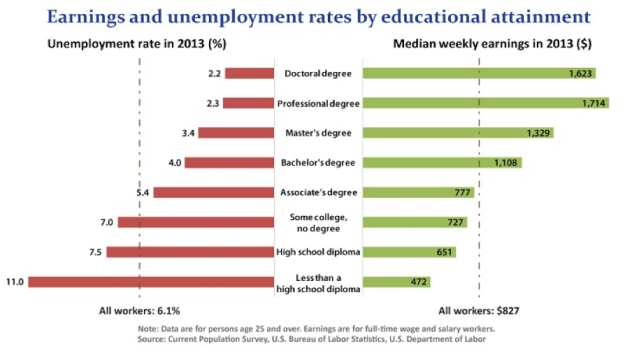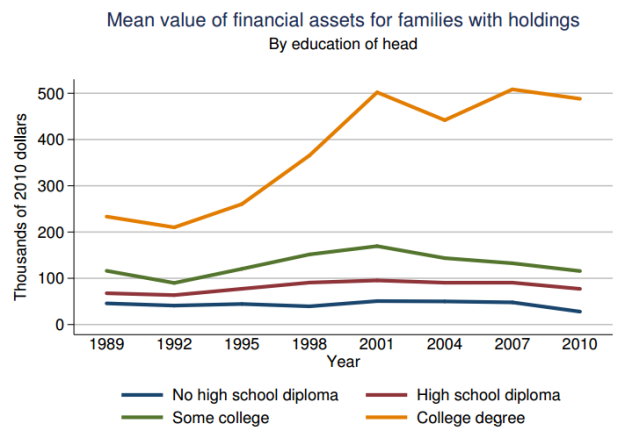Raphael’s painting of the School of Athens captures the essence of what some people would like to think university still is: scholars deeply engrossed in thought, debate and dialogue.

Raphael: The School of Athens. “Sanzio 01” by Raphael – Stitched together from vatican.va. Licensed under Public domain via Wikimedia Commons
Most people tend to think of it the way the U.S. Department of Labor and Wikipedia see it…
Is it any wonder that parents insist on spending money on higher education at any cost? Why wouldn’t they? But there’s a fly in the ointment. Actually, it’s more like sand in the crankcase and sugar in the gas tank: the charts apply only to people who have jobs.
Here are two stories. Both are true.
Story 1
The instructor walked to the front of the room, a small lecture theatre, really. The floor swept gently upward from the podium. Instead of individual seats, each of the 4 tiers featured 2 very long desks separated by an aisle with 6 seats per desk. The 20 of us who made up this particular sales class would spend the next 6 weeks together.
The lecture theatre was one of 2 on the ground floor of a 3-storey building in Princeton, New Jersey. IBM rented the ground floor and the subfloor where the demonstration and presentation rooms were located. Parents and children who rode the elevator up to “3” were there to see the dentist whose building this was.
The class consisted of 17 Americans and 3 Canadians. One of the Americans was Rob M., a former U.S. NAVY fighter pilot from Texas, and he looked the part. That included the naval aviator sunglasses: government issue and very macho. You couldn’t buy them anywhere. We learned the expression “cool your jets” from him. Three of the others and I were newly minted university grads. The rest had fulltime working credentials.
Al E. was the instructor. Football player type. He was wearing a dark blue, 3-piece suit, starched white shirt, “sincere” tie and wing tip shoes otherwise known as brogues or sodbusters. It was clear from the way the rest of us were dressed that we were with Al.
Al led off with a question: “How many of you would rather not be called salesmen?”
My hand and several others went up. Our reasons for raising them were very similar: sales people were smooth-talking glad-handers with loud ties, expense accounts, slacks and houndstooth sports jackets. At IBM, selling was and still is a profession, consultative selling to be precise. At the end of our 6 weeks, we all understood why. No gimmicks, no glad-handing, no back slapping, no smooth talking. Just hard work with emphasis on understanding what the customer needed, lots of emphasis. And on being able to communicate how we were going to use IBM products to address them.
Contrary to popular belief, IBM sales reps did sweat. More than most as it turns out. No more raised hands.
The predicament in which many of the graduates with one or more degrees and no work to show for it find themselves is very reminiscent of the lessons that came out of that IBM sales school. Our business cards were like university diplomas. We were proud to carry them and we were proud to present them. But there were other people out there with business cards and they were good. It’s just that customers expected something extra and better from the ladies and the gentlemen in dark blue suits.
There’s a name for that: value added. It’s what differentiated IBM from the competition.
Universities don’t offer courses in professional, consultative selling. Maybe they should for a modest fee before parents and students commit to 4 or more years. But that’s not going to happen because universities are businesses. First they sell the seats. Then they sell the education wholesale. Graduates have always had to find ways to sell it retail. What makes the job that much more challenging is that, in the eyes of customers, all degrees from the same university are the same and they stay that way until the graduate demonstrates otherwise.
Story 2
I recently attended at a meeting in which an employee with 25 years service with a consumer packaged goods manufacturer was released because the local function the employee headed up was being outsourced and off-shored. The employer explained that they were late moving in this direction vis-à-vis their competitors.
We recalled how Canada Post had been one of the first major corporations in the country to jettison its IT function in the 1990s. In Canada, Data Crown and CSG were laying the groundwork for that decision and others like it. The rationale was that the corporation wasn’t in the computer business: it was in the business of moving mail.
This is the part where the consequences of not understanding the needs of the customer kick in. You’ll see it in these CBC stories: Canadian job skills mismatch: truth or science fiction? Unemployment dips to 7%, most new jobs are part time. Where Canada’s job vacancies are—and aren’t. Loonie tumbles amid huge miss in jobs data, expectations, geopolitical worries. Then there’s Frazier Fathers with his undergraduate degree, two master’s degrees and unemployed in Windsor, Ontario.
Employment and Social Development Canada’s Canadian Occupational Projection System (COPS) predicts that growth in industrial GDP [will] improve in the primary and manufacturing sectors between now and 2020, driven mainly by foreign demand. This should come as welcome news for anyone who plans to graduate with a postsecondary education before the end of the decade.
The free trade agreements into which Canada is entering—including the Canada EU Trade Agreement (CETA), details of which will be released shortly—will change customer behaviour. How will they change employment prospects? What is it going to take to win?
In my 7 years with IBM, I saw “THINK” and “There’s never enough time to do the job right, but there’s always enough time to do the job over” in close proximity to each other more than once. It’s not so easy to do the job over when your first degree involves stocking up on education nobody wants to buy.
If the education system were more about education and less about politics, it would be providing up-to-the-minute information on which to base decisions about advanced schooling. The media are much better at it. So is the price they charge.
Rob Kelly defines gap analysis as “a strategic planning tool to help you understand where you are, where you want to be and how you’re going to get there.” High school graduates must understand that where they and their parents might want them to be and where they may have to be could be two very different places.
The day newly minted graduates receive their diploma is the day they become unemployment statistics—unless they have a job to step into. We have enough statistics. Most of them have dollar signs in front of them: $1.2 trillion owing in student loans in the U.S.; $25 billion to $50 billion in Canada. At least 7 million U.S. students have defaulted on their loan payments at least once.
We need as many gainfully employed graduates as we can produce. For their sake and for the sake of the country.


